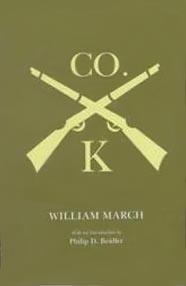Loading AI tools
1933 novel by William March From Wikipedia, the free encyclopedia
Company K is a 1933 novel by William March, first serialised in parts in the New York magazine The Forum from 1930 to 1932, and published in its entirety by Smith and Haas on 19 January 1933, in New York. The book's title was taken from the Marine company that March served in during World War I. It has been regarded as one of the most significant works of literature to come out of the American World War I experience, and it is the most reprinted of all March's work.
 | |
| Author | William March |
|---|---|
| Language | English |
| Genre | Novel |
| Publisher | Smith and Haas (USA) & Victor Gollancz Limited (UK) |
Publication date | January 1933 (USA) & March 1933 (UK) |
| Publication place | United States |
| Media type | Print (hardback & paperback) |
| Pages | 260 pp |
| ISBN | 978-0-8173-0480-5 |
| OCLC | 20220797 |
| 813/.54 20 | |
| LC Class | PS3505.A53157 C6 1989 |
| Followed by | Come in at the Door |
The novel comprises 113 vignettes about World War I Marines in Company K. The novel is told from the viewpoint of 113 different Marines, stretching from the beginning of training to after the war. These sketches create contrasting and horrific accounts of the daily life endured by the common Marine. Many of the accounts stem from actual events witnessed and experienced by the author.
It has often been described as an anti-militarist and an anti-war novel, but March maintained that the content was based on truth and should be viewed as an affirmation of life.
Writer and literary critic for the Spectator Graham Greene places it among the most important of all war novels:
The journalist and writer Christopher Morley had an almost identical response to Company K after reading an advance copy:
Company K has often been compared to Erich Maria Remarque's classic anti-war novel "All Quiet on the Western Front" for its despairing view of war. University of Alabama professor and author Philip Beidler wrote in his introduction to the 1989 republication of the novel:
Years after the completion of Company K, Ernest Hemingway published Men At War: The Best War Stories of All Time. In the introduction Hemingway notes that of all the stories in the book, the two he most desired to publish were omitted, Andre Malraux's Man's Fate and William March's Nine Prisoners, one of the original serialized excerpts from Company K. Hemingway states that the anti-war aspects of the stories would not bode well, as the novel coincides with the beginnings of World War II. He further states:
A film adaptation of the same name was made in 2004. It was written and directed by Robert Clem and starred Ari Filakos.[citation needed]
Seamless Wikipedia browsing. On steroids.
Every time you click a link to Wikipedia, Wiktionary or Wikiquote in your browser's search results, it will show the modern Wikiwand interface.
Wikiwand extension is a five stars, simple, with minimum permission required to keep your browsing private, safe and transparent.